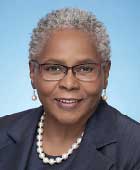The Long Goodbye—But Not Really

In a previous column, I shared some of the challenges that APA has worked on over the past year and offered my assessment of how we are doing in those areas. My future columns will be filled with news about the excellent program planned for APA’s 2019 Annual Meeting in San Francisco and the special events to mark APA’s 175th anniversary, so starting my goodbye in this column just seemed to make sense.
As we get closer to the Annual Meeting, I find myself answering a lot of questions about how this past year has been for me personally, what the memorable moments were, and what I would have done differently if I had had the opportunity. With just about a month and a half left of my presidency, I thought I would reflect on and answer some of these questions. A quote from Dickens’ A Tale of Two Cities comes to mind: “It was the best of times and the worst of times... .” Being the first black elected president of APA has presented some interesting challenges and tremendous opportunities that I will discuss in another column.
Let me start by saying that it has been my honor to serve as president during this interesting and sometimes very difficult time for our health care system. Challenges to the profession, our practices, and our professional autonomy coupled with increasingly regulated treatment processes and burdensome administrative oversight have created work environments that are threatening to our health and well-being in ways that we are just beginning to understand. Risk factors for burnout, depression, and suicide are on the rise, and our responses must be timely, culturally responsive, and effective. I’ve heard from members all across the nation about how much still needs to be done to deliver the levels and quality of care our patients deserve and how much harder achieving that goal has become in this climate. I know that not all members agree with the approaches we have taken to address some of these issues, but I hope you know we are listening and taking your ideas and suggestions into account as we continue working in the best interest of all. Whether it’s MOC or pushing back against unsafe prescribing practices, APA will continue to advocate for what’s in the best interest of our members, patients, and the profession.
Some of my memorable moments include the time I spent with resident-fellow members in Massachusetts, California, South Carolina, Pennsylvania, Georgia, and Tennessee (just to name a few of the states I’ve visited) and listened to their experiences, both good and bad, and what they see as the psychiatry they will enter when they complete training. They are mostly optimistic and enthusiastic about getting out into the world to use the excellent training they are receiving, but I am concerned that some of their training experiences and professional encounters have been “less than satisfying.” Their descriptions of racially charged and sexually inappropriate experiences in a variety of settings for which they often feel they are not adequately trained to handle means that we still have work to do to create a safe and welcoming training environment. A takeaway for us “seasoned” members is that we must step up our game in terms of teaching, mentoring, and supervision if they are to be the successful next generation of psychiatrists we know they are capable of being.
If I could have done something differently, it would have been to spend more time hearing from medical students and residents and identifying ways to help them learn to navigate these difficult situations and prevent them from feeling as though they don’t belong in this field. In addition, I would have liked to do more to identify those areas where we are uniquely qualified to serve as subject matter experts and collaborators in support of achieving improved overall community health.
Psychiatry is a field with tremendous unrealized promise, and I would like to think that some of the work done over the past year is moving the needle a bit closer to the future we all hope for. And while I will be stepping down as your president next month, my commitment to you and the field of psychiatry doesn’t end there: I will spend the rest of my career to work on “what I would have done differently or more of” to support you and continue our quest to ensure that everyone in our communities gets the high-quality care they deserve. It is our responsibility to continue to give a voice to the voiceless. ■



